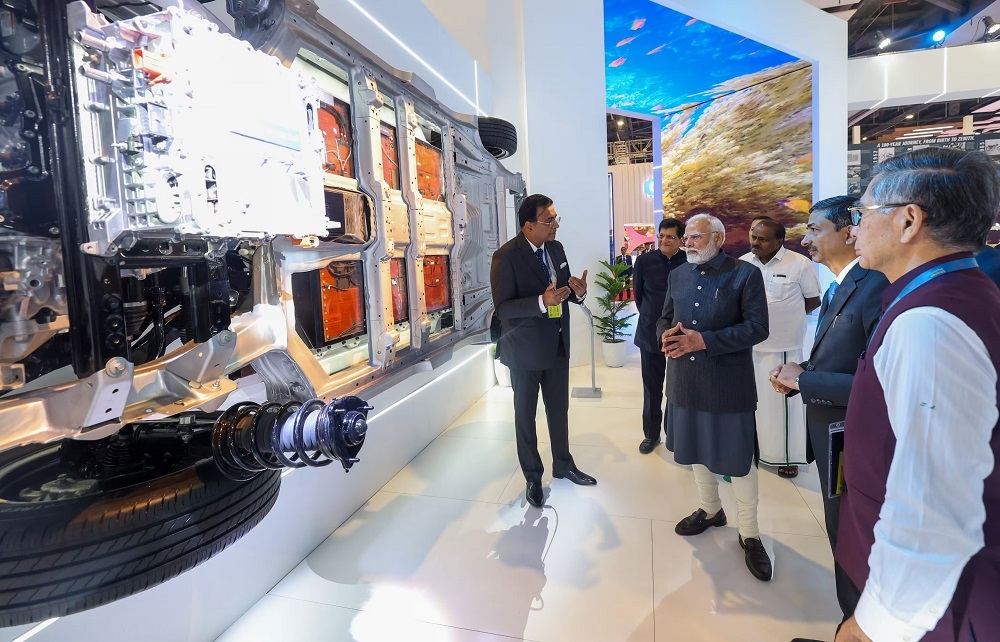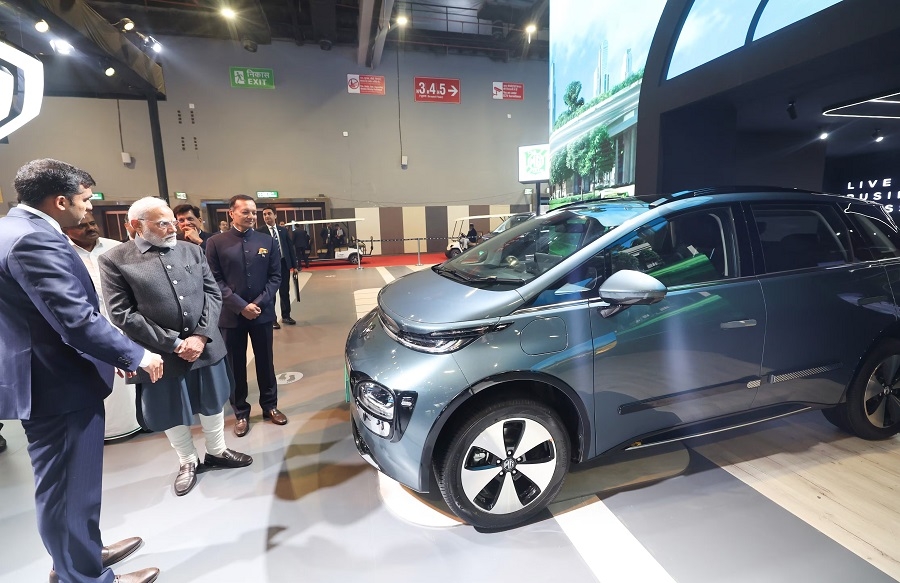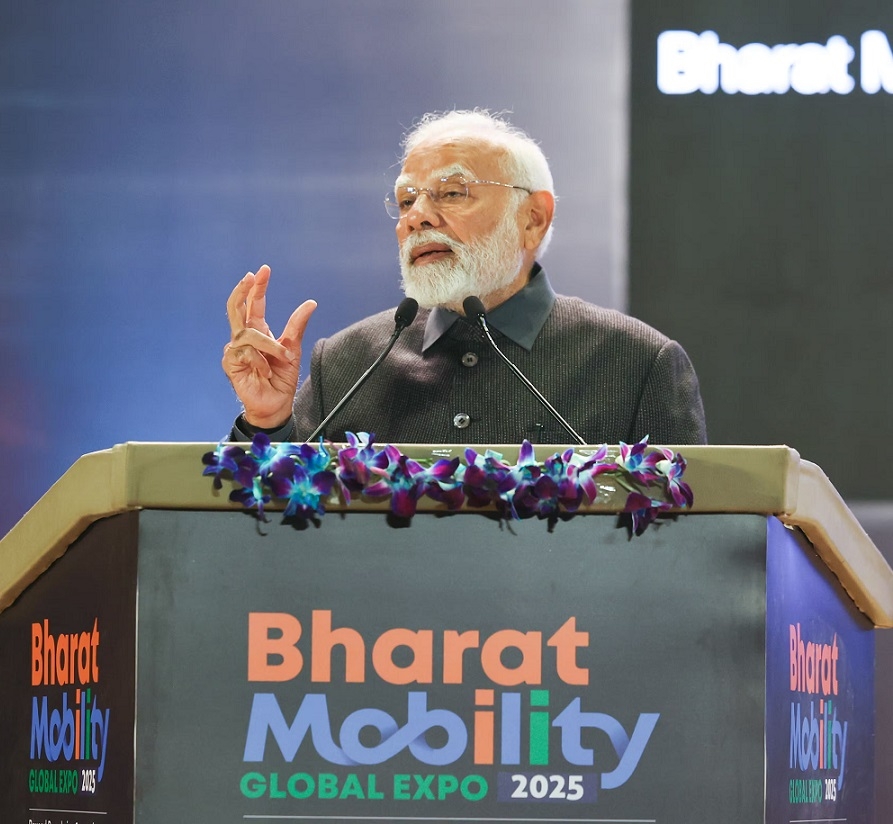PM Modi opens the Bharat Mobility Global Expo 2025
Total Views |
- The journey of Viksit Bharat is set to be one of unprecedented transformation and exponential growth in the mobility sector: PM
- Ease of travel is a top priority for India today: PM
- The strength of the Make in India initiative fuels the growth prospects of the country's auto industry: PM
- Seven Cs of India's mobility solution-Common, Connected, Convenient, Congestion-free, Charged, Clean, Cutting-edge: PM
- Today, India is focusing on the development of Green Technology, EVs, Hydrogen Fuel and Biofuels: PM
- India stands as an outstanding destination for every investor looking to shape their future in the mobility sector: PM
The biggest mobility expo in India, the Bharat Mobility Global Expo 2025, was opened today at Bharat Mandapam in New Delhi by Prime Minister Shri Narendra Modi. Speaking to the crowd, he expressed gratitude to the populace for electing their government for the third time in a row. In contrast to last year's 800 exhibitors and 2.5 lakh attendees, he added, this year's expo has a much larger scope, taking place at two additional locations in the National Capital Region.
Shri Modi stated that numerous new cars would be introduced over the course of the following five days, and many delegates would be present. "This indicates that there is a lot of optimism regarding India's mobility future," he continued. "The automotive industry of India is fantastic and future-ready," Shri Modi said, referring to his visit to the exhibition at the location. He also sent his best wishes to everyone.

During the Indian auto industry's grand event, the prime minister recalled Shri Ratan Tata and Mr. Osamu Suzuki. He said that both of the stalwarts made enormous contributions to the expansion of the Indian auto industry and to realizing the aspirations of India's middle-class families. He was sure that their legacy would continue to motivate India's whole mobility industry.
The Prime Minister said, "India's automobile sector is witnessing an unprecedented transformation, driven by the aspirations of the people and the energy of the youth." He went on to say that the Indian auto industry had expanded by almost 12% in the previous year. He added that the motto of "Make in India and Make for the World" was driving an increase in exports. According to Shri Modi, India sells more cars each year than the populations of many other nations. He said that the fact that about 2.5 crore cars are sold annually shows how much demand there is in India. The prime minister underlined that this expansion demonstrates why India is held to such high standards for mobility in the future.
Shri Modi emphasized that "India is currently the third-largest passenger vehicle market and the fifth-largest economy in the world." He said that India's automobile industry will undergo a transformation and growth never seen before as the nation rises to become one of the top three economies in the world. The prime minister underlined that a number of factors, such as India's sizable youth population, growing middle class, fast urbanization, modern infrastructure development, and reasonably priced cars made possible by the Make in India campaign, will influence the country's mobility in the future. He went on to say that these elements work together to propel the expansion of India's automobile industry.

India will remain the youngest country in the world for many decades, with the youth constituting the largest customer base, the Prime Minister said, underscoring the significance of both need and aspirations for the growth of the auto industry. He pointed out that there will be a lot of demand due to this sizable youth population. The Prime Minister also noted that India's middle class is another significant consumer base, with 25 crore Indians emerging from poverty over the last ten years to form a neo-middle class that is buying their first cars. He went on to say that this group will improve their cars as development progresses, which will help the auto industry.
The Prime Minister stated that "Ease of travel is now a major priority for India," pointing out that the absence of good and wide roads used to be a deterrent for people in India to purchase cars. He pointed out that the previous year's budget included more than ₹11 lakh crore for infrastructure development. The prime minister emphasized that India was building expressways and multilane highways.
"The PM GatiShakti National Master Plan has lowered logistics costs and accelerated multimodal connectivity," he said. The Prime Minister underlined that India will have the most affordable logistics costs in the world thanks to the National Logistics Policy. He pointed out that these initiatives are giving the auto industry a lot of new prospects and are a major factor in the rising demand for automobiles in the nation.
According to Shri Modi, "new technology is also being integrated along with good infrastructure." He said that driving in India was much easier thanks to FASTag. The National Common Mobility Card is further bolstering efforts for smooth travel in India, the Prime Minister underlined. With the quick development of connected cars and autonomous driving, he pointed out that India is currently heading towards smart mobility.
"The PLI schemes have given new momentum to the Make in India campaign, aiding sales of over ₹2.25 lakh crore," the Prime Minister said, highlighting the important role of the Make in India initiative in the growth potential of India's auto industry. He underlined that the sector now has over 1.5 lakh direct jobs thanks to this program. The prime minister pointed out that the auto industry's job growth had a knock-on effect on other industries. He emphasized that the MSME sector produced a significant number of auto parts. He said that as the auto industry expands, new jobs are also being created in the transportation, logistics, MSMEs, and tourism industries.

Shri Modi said that during the last ten years, new opportunities for foreign direct investment (FDI), technology transfer, and international collaborations were formed in the auto industry, highlighting the government's all-encompassing support for the sector at every level. The sector has drawn more than $36 billion in foreign direct investment in just the last four years, the prime minister underlined. In the upcoming years, this number is anticipated to increase, he said. The government's commitment to creating a comprehensive auto manufacturing ecosystem in India was reaffirmed by the prime minister.
The Prime Minister highlighted that the emphasis on green mobility is a component of his vision of the "Seven Cs for mobility solutions": Common, Connected, Convenient, Congestion-free, Charged, Clean, and Cutting-edge. He said that India was lowering its import bill for fossil fuels by developing a mobility system that benefits the economy and the environment. He pointed out that the advancement of biofuels, EVs, hydrogen fuel, and green technology received a lot of attention. The Prime Minister emphasized that this vision has guided the launch of programs like the Green Hydrogen Mission and the National Electric Mobility Mission.
Shri Modi noted that the sale of electric vehicles has grown 640 times in the last ten years, highlighting the explosive growth of electric mobility in India in recent years. He pointed out that more than 16.80 lakh electric vehicles were sold in 2024, compared to just about 2,600 a year ten years ago. He underlined that today's single-day sales of electric vehicles are double that of a full year ten years ago. Given the enormous potential in this market, the prime minister predicted that by the end of this decade, the number of electric vehicles in India could have increased eightfold.
The Prime Minister emphasized the government's ongoing policy decisions and support for the country's electric mobility expansion, noting that the FAME-2 scheme, which was introduced five years ago, has offered incentives totaling more than ₹8,000 crore. He underlined that more than 16 lakh EVs, including more than 5,000 electric buses, were supported by this sum, which was utilized to finance the purchase of EVs and construct charging infrastructure. He pointed out that Delhi was home to more than 1,200 electric buses that the Union government had supplied. In the third term, the Prime Minister announced the launch of the PM E-Drive program, which will finance the acquisition of approximately 28 lakh electric vehicles (EVs), including two-wheelers, three-wheelers, e-ambulances, and e-trucks.
He underlined that more than 70,000 fast chargers for a variety of vehicles will be placed nationwide, and that about 14,000 electric buses will also be bought. In order to support the operation of approximately 38,000 e-buses in small cities throughout the nation, the Prime Minister mentioned that the PM E-Bus service was introduced during the third term. Shri Modi said that avenues were established for international investors interested in EV car manufacturing in India, highlighting the government's ongoing support for EV manufacturing. He emphasized that these initiatives will contribute to the development of India's value chain and the expansion of the ecosystem for high-quality EV manufacturing.
The Prime Minister noted that a green future was emphasized during India's G-20 presidency, underscoring the necessity of consistently promoting solar power and alternative fuels to address the issues of climate change and global warming. He underlined that India was making great progress on solar energy and EVs. He pointed out that one of the main goals for rooftop solar is the PM Suryagarh-Free Electricity Scheme.
The growing need for batteries and storage systems in this industry was emphasized by the prime minister. He said that in order to encourage advanced chemistry cell battery storage, the government had started a PLI scheme worth ₹18,000 crore. Shri Modi emphasized that now was the ideal moment to make large investments in this industry. He encouraged the nation's young people to launch businesses in the energy storage industry. The Prime Minister underlined the importance of developing innovations that can use Indian-sourced materials to produce batteries and storage systems. Although a lot of work is already being done in this area, he pointed out that mission mode advancement was crucial.
Shri Modi emphasized the Union Government's unwavering commitment and clear intent, saying that the government is constantly working on reforms and new policy development. He recommended that businesses implement their own incentive programs to entice more people to scrap their old cars, urging the manufacturers to utilize the vehicle scrapping policy. The prime minister emphasized how important this incentive was and how it would significantly improve the nation's environment.
The prime minister emphasized that technology and innovation were the driving forces behind the automotive sector. He emphasized that India, Asia, and the East hold the key to the future. India is a great place for any investor who wants to see their future in mobility, the prime minister underlined. Shri Modi concluded his speech by assuring everyone that the government was fully behind them and urging them to keep moving forward under the motto "Make in India, Make for the World."
The event was attended by a number of dignitaries, including the Union Minister for Road Transport and Highways, Shri Nitin Gadkari; the Union Minister for Housing and Urban Affairs; the Union Minister for Heavy Industries and Steel, Shri Manohar Lal; the Union Minister for Heavy Industries and Steel, Shri H D Kumaraswamy; the Union Minister for Commerce and Industry, Shri Piyush Goyal; the Union Minister for Micro, Small, and Medium Enterprises, Shri Jitan Ram Manjhi; and the Union Minister for Petroleum and Natural Gas, at the event.
Background
From January 17–22, 2025, the Bharat Mobility Global Expo 2025 will take place at three different locations: the India Expo Center & Mart in Greater Noida, and Bharat Mandapam & Yashobhoomi in New Delhi. The expo will feature more than 20 conferences, nine shows running simultaneously, and pavilions. In order to facilitate cooperation between the industry and regional levels, the Expo will also include state sessions that highlight policies and initiatives in the mobility sector.
The strength of the Make in India initiative fuels the growth prospects of the country's auto industry. pic.twitter.com/T1aVhDO1nM
— PMO India (@PMOIndia) January 17, 2025

